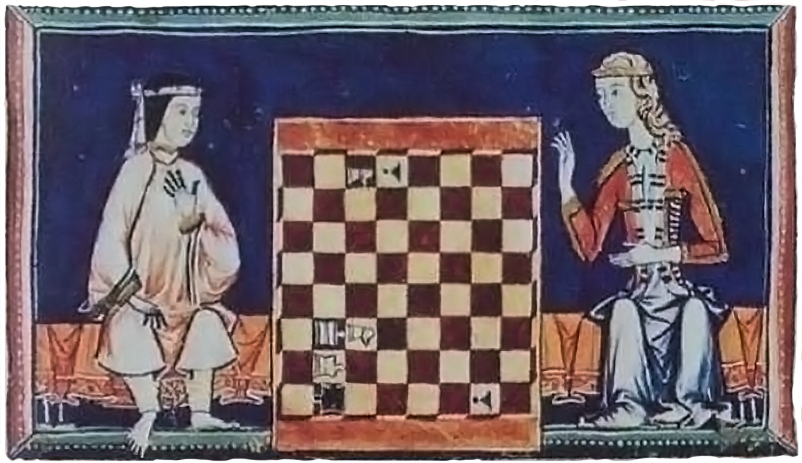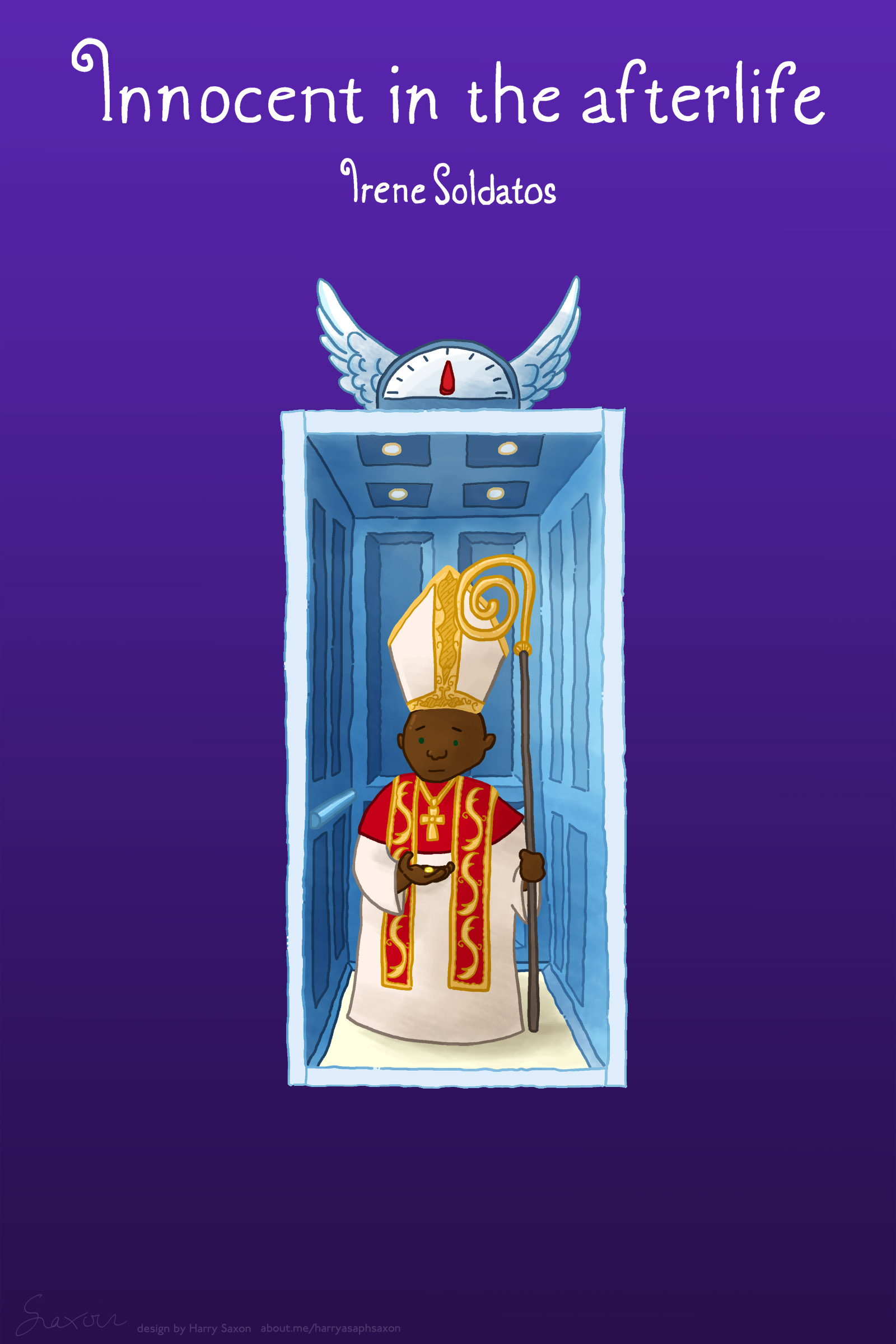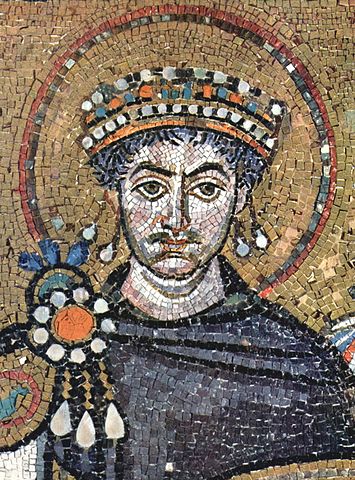
 Let us stay in the 6th century for a bit, but this time move to the East. Justinian I (c. 482 C.E. – 14 November 565 C.E.), known as The Great – which I deliberately place in inverted commas – was Byzantine Emperor from 527-565 C.E. He is considered a saint by the Easter Orthodox Church. He famously married his mistress Theodora, a professional courtesan, who became extraordinarily influential in the politics of the Empire. Justinian sought to revive the Empire’s greatness by reconquering the lost western half of the Roman Empire. He oversaw the uniform rewriting of Roman Law, the Corpus Juris Civilis, which is still the basis of civil law in many modern states. Unfortunately he also wrote many laws, and changed earlier ones; for example forbidding women from getting divorced except under very specific circumstances, whereas previously, because marriage relied on the concept of consent, women could divorce by simply not wishing to be married any more. All they needed do was send a note to their husbands informing them of the fact. Without consent, there was no marriage under earlier Roman Law. Now, a woman could divorce her husband only if one of the following reasons applied:
Let us stay in the 6th century for a bit, but this time move to the East. Justinian I (c. 482 C.E. – 14 November 565 C.E.), known as The Great – which I deliberately place in inverted commas – was Byzantine Emperor from 527-565 C.E. He is considered a saint by the Easter Orthodox Church. He famously married his mistress Theodora, a professional courtesan, who became extraordinarily influential in the politics of the Empire. Justinian sought to revive the Empire’s greatness by reconquering the lost western half of the Roman Empire. He oversaw the uniform rewriting of Roman Law, the Corpus Juris Civilis, which is still the basis of civil law in many modern states. Unfortunately he also wrote many laws, and changed earlier ones; for example forbidding women from getting divorced except under very specific circumstances, whereas previously, because marriage relied on the concept of consent, women could divorce by simply not wishing to be married any more. All they needed do was send a note to their husbands informing them of the fact. Without consent, there was no marriage under earlier Roman Law. Now, a woman could divorce her husband only if one of the following reasons applied:
- He was implicated in a plot against the government or he knew of one and did nothing about it. (Treason)
- He has attempted to kill her or did not warn her of an attempt by others.
- He seeks to deliver her to another man for the purpose of committing adultery.
- He accuses her of adultery but fails to prove his case.
- He entertained another woman in his wife’s home or he is frequently with another woman and refuses to stop after having been warned by his wife’s kinsman or “other person worthy of confidence.”
Not quite the same thing.
Also, Justinian closed Plato’s Academy in Athens, and introduced two new statutes which decreed the total destruction of paganism, even in private life. Below is the description of what these led to, by the historian Procopius.
Procopius of Caesarea (500 C.E. – c. 565 C.E.) was a contemporary of the Byzantine Emperor Justinian I. He is considered the last major historian of the ancient world. He wrote the Wars of Justinian, the Buildings of Justinian and the celebrated Secret History, from which the following excerpt is taken.
And many straight away went everywhere from place to place and compelled such persons as they met to change from their ancestral faith.1 And since such action seemed unholy to the farmer class, they all resolved to make a stand against those who brought this message. So, then, while many were being destroyed by the soldiers and many even made away with themselves, thinking in their folly that they were doing a most righteous thing, and while the majority of them, leaving their homelands, went into exile, the Montani, whose home was in Phrygia, shutting themselves up in their own sanctuaries, immediately set their churches on fire, so that they were destroyed together with the buildings in senseless fashion, and consequently the whole Roman Empire was filled with murder and with exiled men.
And when a similar law was immediately passed touching the Samaritans also, an indiscriminate confusion swept through Palestine. Now all the residents of my own Caesarea2 and of all the other cities, regarding it as a foolish thing to undergo any suffering in defence of a senseless dogma, adopted the name of Christians in place of that which they then bore and by this pretence succeeded in shaking off the danger arising from the law. And all those of their number who were persons of any prudence and reasonableness showed no reluctance about adhering loyally to this faith, but the majority, feeling resentment that, not by their own free choice, but under compulsion of the law, they had changed from the beliefs of their fathers, instantly inclined to the Manichaeans and to the Polytheists, as they are called. And all the farmers, having gathered in great numbers, decided to rise in arms against the Emperor, putting forward as their Emperor a certain brigand, Julian by name, son of Savarus. And when they engaged with the soldiers, they held out for a time, but finally they were defeated in the battle and perished along with their leader. And it is said that one hundred thousand men perished in this struggle, and the land, which is the finest in the world, became in consequence destitute of farmers. And for the owners of the land who were Christians this led to very serious consequences. For it was incumbent upon them, as a matter of compulsion, to pay to the Emperor everlastingly, even though they were deriving no income from the land, the huge annual tax, since no mercy was shown in the administration of this business.
He then carried the persecution to the “Greeks,” as they are called, torturing their bodies and looting their properties. But even those among them who had decided to espouse in word the name of Christians, seeking thus to avert their present misfortunes, these not much later were generally seized at their libations and sacrifices and other unholy acts.3
1The polytheistic religions of Greece and Rome, the adherents of which were simply called “Hellenes”, i.e. Greeks; and various Christian and Jewish sects.
2Caesarea in Palestine was the birthplace of Procopius
3Procopius: The Secret History, trans. based on H.B. Dewing, Loeb Classical Library, 1935, pp. 137-141
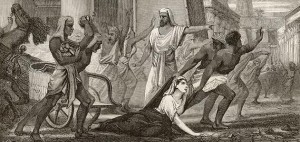
Part 3, following on from part 1 and part 2.
 Chapter XV.—Of Hypatia the Female Philosopher.
Chapter XV.—Of Hypatia the Female Philosopher.
There was a woman at Alexandria named Hypatia, daughter of the philosopher1 Theon, who made such attainments in literature and science, as to far surpass all the philosophers of her own time. Having succeeded to the school of Plato and Plotinus, she explained the principles of philosophy to her auditors, many of whom came from a distance to receive her instructions. On account of the self-possession and ease of manner, which she had acquired in consequence of the cultivation of her mind, she not unfrequently appeared in public in presence of the magistrates. Neither did she feel abashed in coming to an assembly of men. For all men on account of her extraordinary dignity and virtue admired her the more. Yet even she fell a victim to the political jealousy which at that time prevailed. For as she had frequent interviews with Orestes, it was calumniously reported among the Christian populace, that it was she who prevented Orestes from being reconciled to the bishop. Some of them therefore, hurried away by a fierce and bigoted zeal, whose ringleader was a reader named Peter, waylaid her returning home, and dragging her from her carriage, they took her to the church called Cæsareum, where they completely stripped her, and then murdered her with tiles2.After tearing her body in pieces, they took her mangled limbs to a place called Cinaron, and there burnt them. This affair brought not the least opprobrium, not only upon Cyril,but also upon the whole Alexandrian church. And surely nothing can be farther from the spirit of Christianity than the allowance of massacres, fights, and transactions of that sort. This happened in the month of March during Lent, in the fourth year of Cyril’s episcopate, under the tenth consulate of Honorius, and the sixth of Theodosius.3
1 and mathematician. He arranged Euclid’s Elements and Ptolemy’s Handy Tables.
2 Tile shards, presumably, i.e. flayed her alive with something like this.
3 Socrates and Sozomenus, Ecclesiastical Histories, ed. and trans. Philip Schaff, WM. B. Eerdmans Publishing Company, Michigan, p. 160
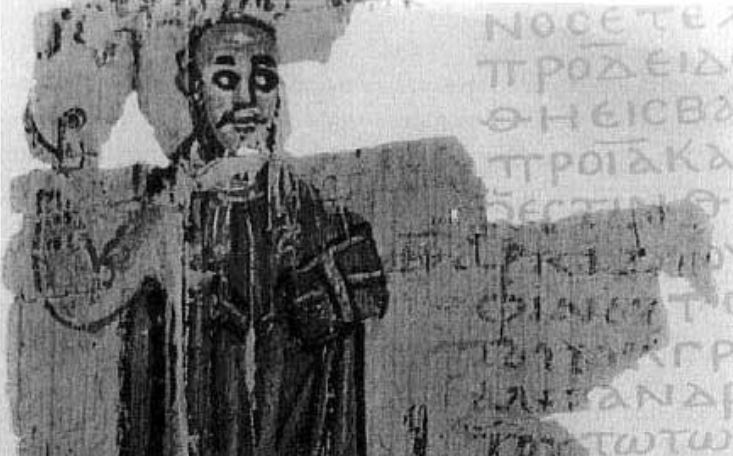
Part 2 of series of events, which began here.
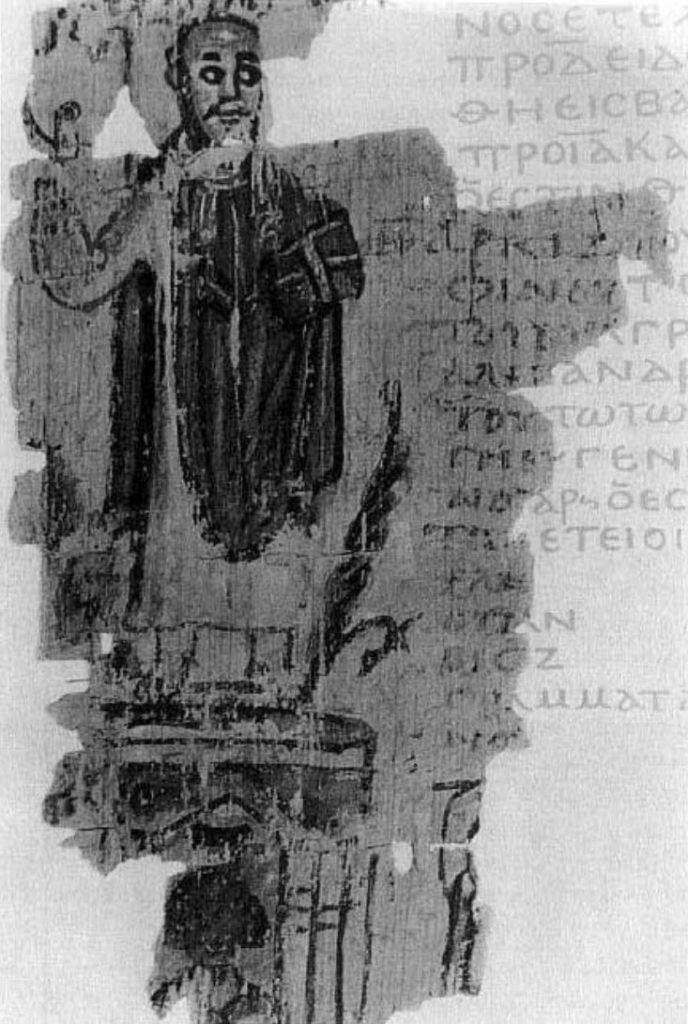
Theophilus Bishop of Alexandria with the Serapeum he destroyed
1 The previous Bishop of Alexandria, who caused the Serapeum, along with other pagan temples, to be destroyed.
2 Socrates and Sozomenus, Ecclesiastical Histories, ed. and trans. Philip Schaff, WM. B. Eerdmans Publishing Company, Michigan, p. 160
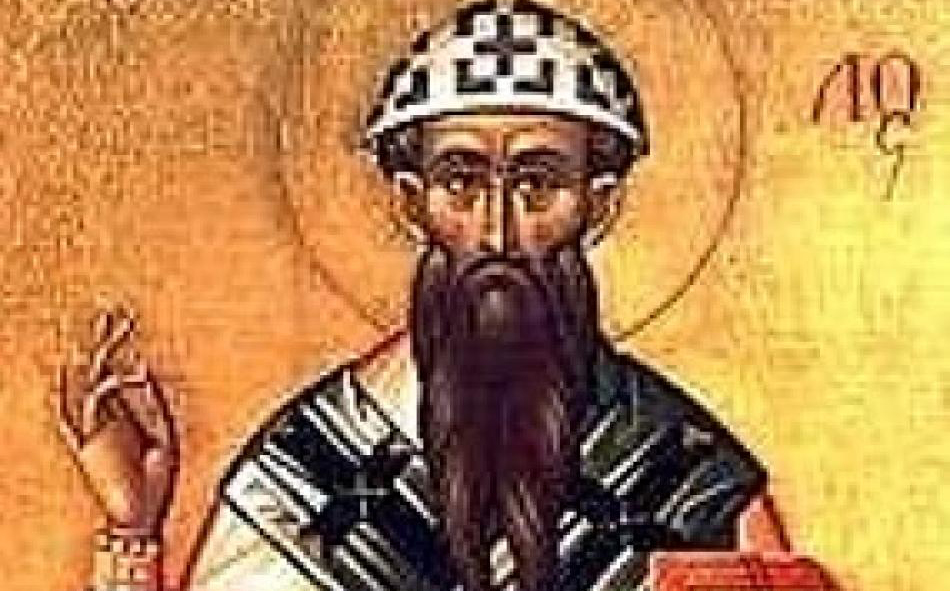
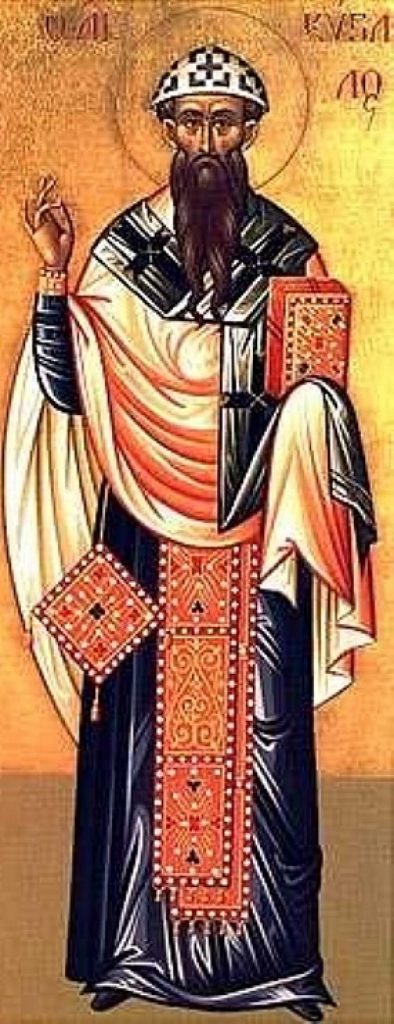
Bishop Cyril of Alexandria
This is the first of three posts all of which deal with one series of events. The series of events leading to the murder of the pagan philosopher and scientist Hypatia by a Christian mob in Alexandria in 425 C.E. She was, however, but collateral damage in a much more important struggle; that of secular versus religious authority. Nevertheless, her death sealed the victory of religious authority, since after this the Prefect, Orestes, gives up his struggle against Bishop Cyril, he gradually fades from political life, and finally disappears from historical record altogether. Where he went, what he did in later life, where, when and how he died, we don’t know.
The text is from the Christian historiographer Socrates Scholasticus’s Historia Ecclesiastica. He was born in Constantinople c. 380 C.E. and died some time after 439. The full text of Historia Ecclesiastica in English translation can be found here.
Chapter XIII.—Conflict between the Christians and Jews at Alexandria: and breach between the Bishop Cyril and the Prefect Orestes.
About this same time it happened that the Jewish inhabitants were driven out of Alexandria by Cyril the bishop on the following account. The Alexandrian public is more delighted with tumult than any other people: and if at any time it should find a pretext, breaks forth into the most intolerable excesses; for it never ceases from its turbulence without bloodshed. It happened on the present occasion that a disturbance arose among the populace, not from a cause of any serious importance, but out of an evil that has become very popular in almost all cities, viz. a fondness for dancing exhibitions.
In consequence of the Jews being disengaged from business on the Sabbath, and spending their time, not in hearing the Law, but in theatrical amusements, dancers usually collect great crowds on that day, and disorder is almost invariably produced. And although this was in some degree controlled by the governor of Alexandria, nevertheless the Jews continued opposing these measures. And although they are always hostile toward the Christians they were roused to still greater opposition against them on account of the dancers. When therefore Orestes the prefect was publishing an edict—for so they are accustomed to call public notices—in the theatre for the regulation of the shows, some of the bishop Cyril’s party were present to learn the nature of the orders about to be issued. There was among them a certain Hierax, a teacher of the rudimental branches of literature, and one who was a very enthusiastic listener of the bishop Cyril’s sermons, and made himself conspicuous by his forwardness in applauding.
When the Jews observed this person in the theatre, they immediately cried out that he had come there for no other purpose than to excite sedition among the people. Now Orestes had long regarded with jealousy the growing power of the bishops, because they encroached on the jurisdiction of the authorities appointed by the emperor, especially as Cyril wished to set spies over his proceedings; he therefore ordered Hierax to be seized, and publicly subjected him to the torture in the theatre.
Cyril, on being informed of this, sent for the principal Jews, and threatened them with the utmost severities unless they desisted from their molestation of the Christians. The Jewish populace on hearing these menaces, instead of suppressing their violence, only became more furious, and were led to form conspiracies for the destruction of the Christians; one of these was of so desperate a character as to cause their entire expulsion from Alexandria; this I shall now describe. Having agreed that each one of them should wear a ring on his finger made of the bark of a palm branch, for the sake of mutual recognition, they determined to make a nightly attack on the Christians.
They therefore sent persons into the streets to raise an outcry that the church named after Alexander was on fire. Thus many Christians on hearing this ran out, some from one direction and some from another, in great anxiety to save their church. The Jews immediately fell upon and slew them; readily distinguishing each other by their rings.
At daybreak the authors of this atrocity could not be concealed: and Cyril, accompanied by an immense crowd of people, going to their synagogues—for so they call their house of prayer—took them away from them, and drove the Jews out of the city, permitting the multitude to plunder their goods. Thus the Jews who had inhabited the city from the time of Alexander the Macedonian were expelled from it, stripped of all they possessed, and dispersed some in one direction and some in another. One of them, a physician named Adamantius, fled to Atticus bishop of Constantinople, and professing Christianity, some time afterwards returned to Alexandria and fixed his residence there.
But Orestes the governor of Alexandria was filled with great indignation at these transactions, and was excessively grieved that a city of such magnitude should have been suddenly bereft of so large a portion of its population; he therefore at once communicated the whole affair to the emperor. Cyril also wrote to him, describing the outrageous conduct of the Jews; and in the meanwhile sent persons to Orestes who should mediate concerning a reconciliation: for this the people had urged him to do. And when Orestes refused to listen to friendly advances, Cyril extended toward him the book of gospels,believing that respect for religion would induce him to lay aside his resentment. When, however, even this had no pacific effect on the prefect, but he persisted in implacable hostility against the bishop, the following event afterwards occurred.1
1Socrates and Sozomenus, Ecclesiastical Histories, ed. and trans. Philip Schaff, WM. B. Eerdmans Publishing Company, Michigan, p. 159-160
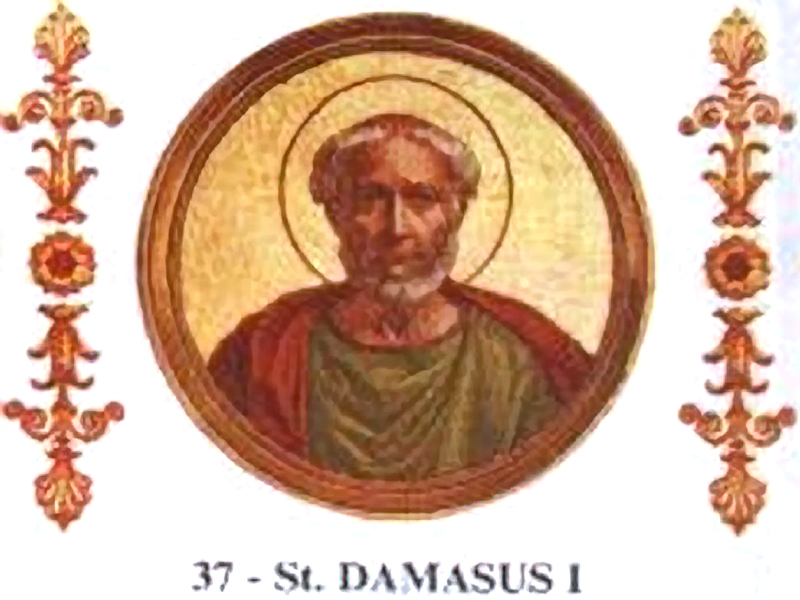
 Pope Saint Damasus I was the bishop of Rome from 366 to 384 C.E. He succeeded to the papacy amidst intense factional violence. His rival, Ursinus, was elected simultaneously, which let to such violence and bloodshed that eventually the intervention of Emperor Valentinian I was required in order to quell it. Ursinus had the support of the plebeians, while Pope Damasus was exceedingly popular with the aristocracy, and in particular the great ladies, which led to his enemies calling him Auriscalpius Matronarum: the ladies’ ear-scratcher.
Pope Saint Damasus I was the bishop of Rome from 366 to 384 C.E. He succeeded to the papacy amidst intense factional violence. His rival, Ursinus, was elected simultaneously, which let to such violence and bloodshed that eventually the intervention of Emperor Valentinian I was required in order to quell it. Ursinus had the support of the plebeians, while Pope Damasus was exceedingly popular with the aristocracy, and in particular the great ladies, which led to his enemies calling him Auriscalpius Matronarum: the ladies’ ear-scratcher.
To put all this in context, emperor Constantine I issued his edict of toleration of Christianity in 313 C.E.
As his successor [as prefect] came Viventius, a former court-chancellor, a just and prudent man of Pannonia, whose administration was quiet and mild, rich in an abundance of everything. But he, too, was alarmed by sanguinary outbreaks of the factions of the people, which were caused by the following affair. Damasus and Ursinus, burning with a superhuman desire of seizing the bishopric, engaged in bitter strife because of their opposing interests; and the supporters of both parties went even so far as conflicts ending in bloodshed and death. Since Viventius was able neither to end nor to diminish this strife, he was compelled to yield to its great violence, and retired to the suburbs. And in the struggle Damasus was victorious through the efforts of the party which favoured him. It is a well-known fact that in the basilica of Sicininus,1 where the assembly of the Christian sect is held, in a single day a hundred and thirty-seven corpses of the slain were found, and that it was only with difficulty that the long-continued frenzy of the people was afterwards quieted.2
1 Now Santa Maria Maggiore.
2 Ammianus Marcellinus, The History, book XXVII, trans. J.C. Rolfe, Vol 3, Loeb Classical Library, 1939, p.21.

 Let us stay in the 6th century for a bit, but this time move to the East. Justinian I (c. 482 C.E. – 14 November 565 C.E.), known as The Great – which I deliberately place in inverted commas – was Byzantine Emperor from 527-565 C.E. He is considered a saint by the Easter Orthodox Church. He famously married his mistress Theodora, a professional courtesan, who became extraordinarily influential in the politics of the Empire. Justinian sought to revive the Empire’s greatness by reconquering the lost western half of the Roman Empire. He oversaw the uniform rewriting of Roman Law, the Corpus Juris Civilis, which is still the basis of civil law in many modern states. Unfortunately he also wrote many laws, and changed earlier ones; for example forbidding women from getting divorced except under very specific circumstances, whereas previously, because marriage relied on the concept of consent, women could divorce by simply not wishing to be married any more. All they needed do was send a note to their husbands informing them of the fact. Without consent, there was no marriage under earlier Roman Law. Now, a woman could divorce her husband only if one of the following reasons applied:
Let us stay in the 6th century for a bit, but this time move to the East. Justinian I (c. 482 C.E. – 14 November 565 C.E.), known as The Great – which I deliberately place in inverted commas – was Byzantine Emperor from 527-565 C.E. He is considered a saint by the Easter Orthodox Church. He famously married his mistress Theodora, a professional courtesan, who became extraordinarily influential in the politics of the Empire. Justinian sought to revive the Empire’s greatness by reconquering the lost western half of the Roman Empire. He oversaw the uniform rewriting of Roman Law, the Corpus Juris Civilis, which is still the basis of civil law in many modern states. Unfortunately he also wrote many laws, and changed earlier ones; for example forbidding women from getting divorced except under very specific circumstances, whereas previously, because marriage relied on the concept of consent, women could divorce by simply not wishing to be married any more. All they needed do was send a note to their husbands informing them of the fact. Without consent, there was no marriage under earlier Roman Law. Now, a woman could divorce her husband only if one of the following reasons applied:








